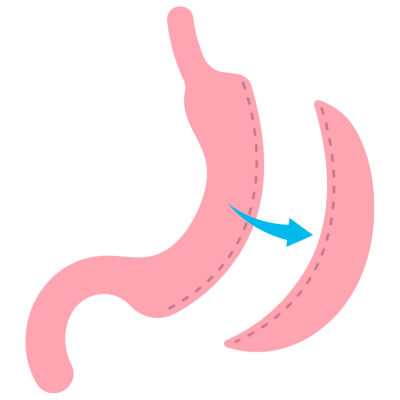Introduction
In today’s fast-paced world, where convenience often trumps health, obesity has emerged as a global epidemic. According to the World Health Organization, over 650 million adults were obese as of 2016, a number that has nearly tripled since 19751. This startling statistic underscores the urgent need for effective weight management solutions. Among the myriad options available, bariatric surgery has risen to prominence, offering a lifeline to those for whom traditional methods have fallen short. This article delves into one of the most popular forms of bariatric surgery: gastric sleeve surgery. It aims to provide a comprehensive overview of the procedure, its mechanisms, outcomes, and how it compares to other surgical weight loss options, equipping you with the knowledge to make informed decisions about your health and well-being.
What is Gastric Sleeve Surgery?
Gastric sleeve surgery, or sleeve gastrectomy, is a procedure that significantly reduces the size of your stomach. By removing about 80% of it, what’s left is a tube or “sleeve” that can hold much less food. This surgery is a permanent alteration designed to help you lose weight by limiting how much you can eat.


How Does the Gastric Sleeve Work?
The magic behind gastric sleeve surgery isn't just about making your stomach smaller. It also changes your body's hunger hormones. This means you'll feel full faster and stay satisfied longer. The surgery also decreases the production of hormones that make you feel hungry, helping you eat less naturally. Since you're consuming less, the quality of what you eat matters more; even a smaller amount of an unhealthy diet remains detrimental. Therefore, prioritizing protein in your meals is crucial for maintaining health and supporting recovery.
The Journey of Weight Loss
How Much Weight Can You Lose?
After gastric sleeve surgery, you might lose a lot of weight. On average, patients lose about 60% to 70% of their excess body weight. However, it's crucial to remember that results vary based on your committed to lifestyle changes. The more dedicated you are to adopting lifestyle changes, the more impressive your results can be.
How Does Weight Loss Work After Gastric Sleeve?
The weight loss journey post-surgery is gradual. Understanding how the surgery works, can help to bolster your continued weight loss results. Initially, you'll see rapid weight loss as your calorie intake drops with a reduced stomach capacity. Over time, weight loss slows down as you adjust to new eating habits. Success depends on sticking to a healthy diet and regular exercise. It's vital to focus on a diet rich in proteins to aid healing and maintain weight loss effectively. Regular exercise becomes essential, not just for shedding pounds but for boosting overall health. Additionally, embracing a positive mindset and leaning on a strong support network are crucial for overcoming the emotional hurdles of this life-changing journey. These lifestyle changes, combined, are the driving force behind achieving your weight loss targets post-surgery.
How Long Does Gastric Sleeve Last?
The gastric sleeve is a tool you have for weight loss. But, how long does its effect last? The surgery permanently changes your stomach size, yet the lasting success in shedding pounds depends on your lifestyle after surgery. Significant weight loss is common in the early years, but keeping it off is a lifelong effort. Following the right diet, staying active, and making smart lifestyle choices are key to maintaining the benefits of your gastric sleeve. Essentially, the procedure gives you a jumpstart on weight loss, but its long-term impact is up to you.
Comparing Bariatric Surgeries
Can You Provide Details About Bariatric Sleeve Surgery?
Gastric sleeve surgery stands out for its simplicity and effectiveness. Unlike other procedures, it doesn't involve rerouting your intestines. This makes it a safer option with fewer complications and a quicker recovery time.
What is the Difference Between Gastric Sleeve Surgery and Gastric Bypass Surgery?
While both surgeries aim to help with weight loss, they work differently. Gastric bypass surgery involves creating a small pouch from the stomach and rerouting the intestines, which may lead to more weight loss but also comes with higher risks and a more complex recovery. In contrast, gastric sleeve surgery is less invasive, focusing on only reducing stomach size to limit food intake.
Conclusion
To summarize, gastric sleeve surgery presents a significant advancement in the fight against obesity, offering a viable solution for those struggling with severe weight issues. Through the reduction of the stomach size and the alteration of hunger hormones, this procedure facilitates substantial weight loss, empowering individuals to embark on a healthier and more active lifestyle. While it boasts benefits such as simplicity, effectiveness, and a relatively safer profile compared to other bariatric procedures, it's crucial to recognize that its success hinges on the patient's commitment to lifelong dietary and lifestyle changes. As we've explored the nuances of gastric sleeve surgery, including its mechanism, expected outcomes, and comparison with gastric bypass, it's evident that this surgical intervention is more than just a medical procedure—it's a stepping stone towards a new lease on life. Armed with this knowledge, individuals can make informed decisions about their weight loss journey, understanding that the path to sustainable health is not solely in the surgery itself but in the continuous effort that follows.
Citation
1 World Health Organization. (2021, June 9). Obesity. WHO. https://www.who.int/news-room/facts-in-pictures/detail/6-facts-on-obesity#:~:text=In%202016,%20more%20than%201.9,tripled%20between%201975%20and%202016.
Take the First Step Today!
Take the First Step Today
Ready to transform your life? Contact us to begin your journey. Our team is eager to guide you towards achieving your health and happiness goals. With our commitment to your success and a supportive community, you're not just taking a step towards weight loss; you're stepping into a new, healthier chapter of your life.



